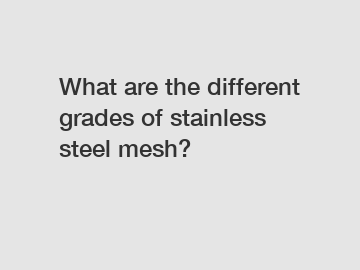What are the different grades of stainless steel mesh?
Stainless steel mesh is a versatile and durable material with a wide range of applications in various industries. One of the key factors to consider when choosing stainless steel mesh is the grade of the material. Stainless steel mesh is available in different grades, each with its own unique properties and characteristics. Understanding the different grades of stainless steel mesh can help you choose the right material for your specific needs.
**Types of Stainless Steel Mesh**.
Stainless steel mesh is commonly classified into three main types based on the grade of stainless steel used: 304, 316, and 430. Each type has its own distinct characteristics that make it suitable for different applications.

**304 Grade Stainless Steel Mesh**.
304 grade stainless steel mesh is one of the most common types of stainless steel mesh available on the market. It is known for its excellent corrosion resistance, formability, and weldability. 304 stainless steel mesh is ideal for applications where exposure to harsh chemicals or extreme weather conditions is a concern. Additionally, 304 stainless steel mesh is easy to clean and maintain, making it a popular choice for food processing, pharmaceutical, and architectural applications.
**316 Grade Stainless Steel Mesh**.
316 grade stainless steel mesh is a higher-grade material that offers superior corrosion resistance compared to 304 stainless steel mesh. It contains molybdenum, which enhances its resistance to pitting and crevice corrosion in chloride environments. 316 stainless steel mesh is commonly used in marine environments, chemical processing plants, and medical devices where high levels of corrosion resistance are required. Additionally, 316 stainless steel mesh is also suitable for applications where exposure to high temperatures is a concern.
**430 Grade Stainless Steel Mesh**.
430 grade stainless steel mesh is a less expensive alternative to 304 and 316 stainless steel mesh. While it offers good corrosion resistance and formability, it is not as durable or resistant to high temperatures as the higher-grade stainless steel meshes. 430 stainless steel mesh is commonly used in indoor applications where corrosion resistance is not a primary concern, such as decorative panels, window screens, and ventilation grilles.
**Choosing the Right Grade of Stainless Steel Mesh**.
When selecting a grade of stainless steel mesh for your application, it is important to consider the specific requirements of the project. Factors such as exposure to corrosive environments, temperature fluctuations, and aesthetic preferences should be taken into account. Consulting with a stainless steel mesh supplier can help you determine the most suitable grade for your needs and ensure that you choose a material that will perform optimally in your application.
**In Conclusion**.
Understanding the different grades of stainless steel mesh is essential for selecting the right material for your specific needs. Whether you require excellent corrosion resistance, high-temperature resistance, or a cost-effective solution, there is a grade of stainless steel mesh that will meet your requirements. By evaluating the properties and characteristics of each grade, you can make an informed decision and choose a stainless steel mesh that will deliver the performance and longevity you need for your project.
For more information on the different grades of stainless steel mesh and to find the right material for your application, contact us today.
Contact Us.
If you want to learn more, please visit our website Metal Mesh Filter, plain woven stainless steel wire mesh, Epoxy Coated Alloy Mesh.


